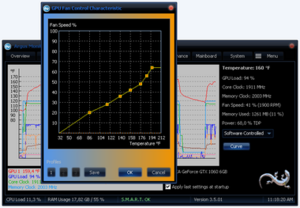Software:Argus Monitor
 Argus Monitor 3.5.01 in Windows 10 | |
| Original author(s) | Argotronic UG |
|---|---|
| Developer(s) | Argotronic UG |
| Initial release | 2009 |
| Written in | C++, C |
| Operating system | Windows 7 and later |
| Size | 9MB |
| Available in | 3 languages |
List of languages English, German, Spanish | |
| Type | CPU/GPU/Mainboard Fan Control, System temperature and HDD (hard disk drive) health monitor |
| License | Shareware |
| Website | www |
Argus Monitor is a software for monitoring temperatures and status of several system components, e.g. CPU temperature, GPU temperature and HDD temperature. All temperatures are displayed numerically as well as graphically. Additionally, the status of the hard disk drive will be monitored by constantly checking the so-called critical SMART attributes. If one attribute decreases, the user is displayed an information (optionally), informing him of decreased HDD health. If one of the SMART attributes reaches its specified threshold, the user gets a warning that a hardware failure is imminent.
As a second major feature, Argus Monitor offers fan control for system and GPU fans using any of the temperature sources available to the program, like CPU, GPU, VRM, mainboard temperatures as well as temperatures of disk drives and SSDs.
Currently, Argus Monitor supports hard disk drives attached to SATA, (P)ATA, eSATA ports and is also one of the very few programs that is able to read S.M.A.R.T. information off of disk drives attached using USB external drive enclosures. Furthermore, Argus Monitor is able to access individual hard drives that are part of a RAID set.[1]
Argus Monitor also measures the CPU core frequency—and graphs it separately for each core --, making it possible to verify if the energy management is underclocking the CPU cores if they are in idle state or the new "Turbo Boost" mode of Intel Core i5/i7 processors is working correctly.
Notes
- ↑ Currently not all RAID controllers are supported.
External links
- Study by Google regarding the possibility to predict HDD failures by monitoring SMART attributes
